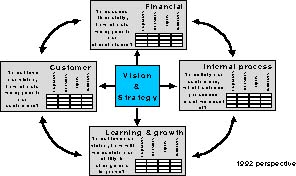Back in 1997 whilst working with Bob Kaplan I asked him about his book, “The Balanced Scorecard” and wondered, “with so many consultants copying things from the book, , “Have we given too much away by writing the books?”
His reply: “Don’t worry about what we put in the book. That was 18 month old consulting when we wrote it”.
Early approaches:
Some people think the Balanced Scorecard is simply…
A collection of measures = “Scorecard”

Placed in groups = Balanced

Bear Bob Kaplan’s answer in mind when you consider that this diagram came from page nine of their first book.
Please, please, please don’t implement it this way
You can try, but you’ll miss great opportunities to deliver results, it is unlikely to create change and it probably won’t last more than a year or so. Amazingly, we still see people recommending this approach and others trying and using it. It has moved on extensively since then.
But this is a very old view dating back to the early use. The whole Balanced Scorecard approach has moved on considerably since then. By 1994/5, in Renaissance, the company set up by Norton & Kaplan, it was clear that this approach did not work well. Measures were merely surrogates for what was really intended, the objective. Also, there was often no relationship between the measures in the perspectives, even though it was implied. That is why strategy mapping evolved, using objectives rather than measures, to communicate what needs to be achieved, with the objectives being measured. In publishing their third book on the subject it is clear they are still trying to get that message across to many.
Of course if you want to find out some of what was not in the books, talk to us or see below.
Some common mistakes people make:
Too many (of the wrong type of) measures: Research by the Hackett Group shows BSC implementations are failing because they use too many measures, which just causes confusion and lack of focus. We find typical managers have over 100 measures (far too many). Also, those measures that they use are dominated by financial and lagging measures. These do not help you anticipate problems and drive performance, they merely tell you that you arrived, after you arrived there. Refer to paper
Focus on measures: Good scorecard implications work out what is important to measure and communicate, before they look at the measures. “Don’t manage what you can measure: Measure what you want to manage”. Poor implementations pile measure upon measure in the vain hope it will inform more and somehow communicate the strategy better. It won’t. Refer to paper
Destroying the cause and effect relationship between perspectives: The key relationship in commercial organisations is between the perspectives. A different one applies in not-for profit and public sector organisations. All start with the premise: Our capabilities, drive what we do, which affects our customers, financial and other outcomes for our stakeholders. And don’t confuse strategic themes with perspectives. This is the most common reason for people changing the perspectives and losing the causal relationships. Refer to paper
Losing the focus: Being clear it is about what really matters, not everything you do. It is about focusing on the future, not the here and now. What will make the biggest difference to the organisation? Poor implementations measure everything, except what is really important. Refer to paper
It is a one-off exercise: “We created these measures and they are still useful 1-2-3 years later”. Perhaps, but in that time has the strategy changed? Has the focus of the organisation changed? Are they still relevant to what will drive and change performance today? Perhaps, perhaps not. Refer to paper
It is about the software: “If we implement performance measurement software it will solve the problem.” Sorry, it won’t, unless the problem is focused on the collection and display of the information. If you want to embed the existing performance management culture, with all its problems, go ahead. If you want to change the way people manage, the software is only 20% of the issue. You can get the software wrong, but not as much as you can get the performance management culture wrong. Refer to paper
You could explore our range of Balanced Scorecard services, but its far better to talk to us, isn’t it. If you do want more information before you talk to us, then take a look at:
Want to learn how to implement it properly?
Having worked with the originators of the Balanced Scorecard, Norton & Kaplan, we have a unique, and extensive, experience. How to use the approach to execute strategy successfully and therefore improve the performance of your organisation, measurably. Clients are still using our approach over 5 years after we worked with them. This clearly demonstrates the effectiveness and persistency of our consultancy methods.

